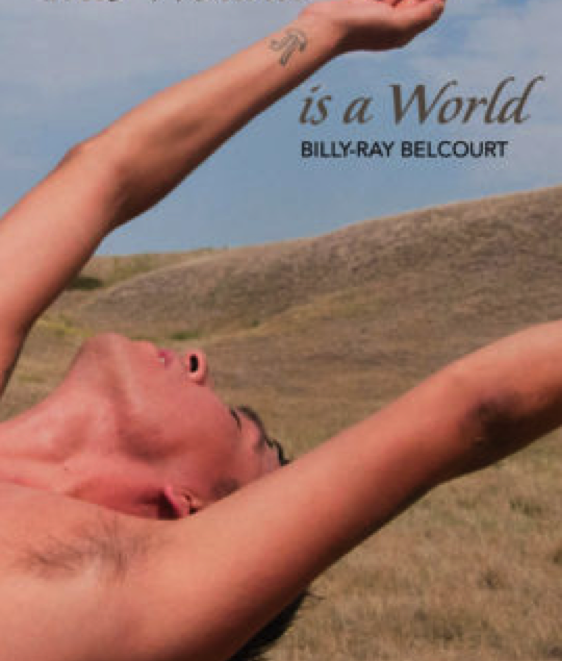
PRISM international editors had a difficult time choosing a few books they read and loved this year, but managed to whittle down two to three picks each:
Jessica Johns, promotions editor, picks:
This Accident of Being Lost by Leanne Betasamosake Simpson
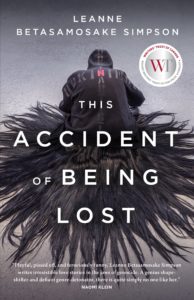 It will be of no surprise to anyone who has had even one conversation with me to know that this book is in my top picks for 2017. And probably my life. I saw myself, my family, and my relationships in these pages. I saw a kind of life and story sharing that I didn’t think or know possible. I’ve never felt so full, so empty, or laughed so hard while reading a text. I will always turn to this book when I am every feeling ungrounded, unsure, or accidentally lost.
It will be of no surprise to anyone who has had even one conversation with me to know that this book is in my top picks for 2017. And probably my life. I saw myself, my family, and my relationships in these pages. I saw a kind of life and story sharing that I didn’t think or know possible. I’ve never felt so full, so empty, or laughed so hard while reading a text. I will always turn to this book when I am every feeling ungrounded, unsure, or accidentally lost.
Read Jessica’s six reasons why This Accident of Being Lost will have you openly weeping in coffee shops and ignoring cute dogs at the farmers market.
This Wound is a World by Billy-Ray Belcourt
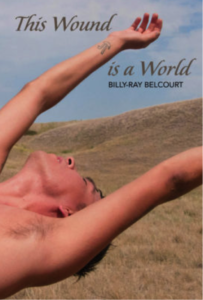 This collection of poetry moved and astounded me. I’ve never seen language and form used so intuitively in a collection of poetry. With every revisit I’m finding something else I hadn’t noticed before, another gem to hold onto and unpack. This book, to me, is a piece of home that I can take with me everywhere.
This collection of poetry moved and astounded me. I’ve never seen language and form used so intuitively in a collection of poetry. With every revisit I’m finding something else I hadn’t noticed before, another gem to hold onto and unpack. This book, to me, is a piece of home that I can take with me everywhere.
Read Jessica and Selina’s conversation with Billy-Ray Belcourt in which they talk about Indian Time and armpits.
Kyla Jamieson, prose editor, picks:
300 Arguments by Sarah Manguso
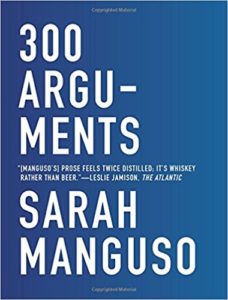 This daring, brilliant book breaks all kinds of writing “rules” (don’t write about dreams; don’t write about writing or being a writer; show, don’t tell), but never does so solely for the sake of rebellion. Across 300 short sections, in an array of anecdotes, aphorisms, observations, and arguments that defy summation, Manguso contemplates grief, desire, motherhood, depression, illness, envy, intimacy, power, privilege, identity, and more. The result is a self-portrait of a mind, in all its certitude and fallibility; the purpose of Manguso’s rebellion is to show us something utterly unique and true.
This daring, brilliant book breaks all kinds of writing “rules” (don’t write about dreams; don’t write about writing or being a writer; show, don’t tell), but never does so solely for the sake of rebellion. Across 300 short sections, in an array of anecdotes, aphorisms, observations, and arguments that defy summation, Manguso contemplates grief, desire, motherhood, depression, illness, envy, intimacy, power, privilege, identity, and more. The result is a self-portrait of a mind, in all its certitude and fallibility; the purpose of Manguso’s rebellion is to show us something utterly unique and true.
Game Change by Ken Dryden
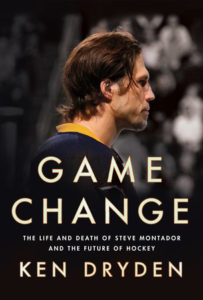 Game Change is straight-up informative non-fiction, skillfully structured and narrated. This is a book about hockey and hockey players, but it is also about concussions and post-concussion syndrome (PCS); profiles of retired NHL players Keith Primeau, Marc Savard, and Steve Montador describe PCS symptoms that anyone who has lived with or through the condition will recognize. Interwoven with an exploration of the history, development, and regulation of hockey is the tragic story of Steve Montador, a Vancouver-born defenceman who died while suffering from PCS and extensive brain damage, and who, when his mind and memory were most fractured, when his “usual self” was someone he could imitate but no longer inhabit, hoped to find purpose through serving others.
Game Change is straight-up informative non-fiction, skillfully structured and narrated. This is a book about hockey and hockey players, but it is also about concussions and post-concussion syndrome (PCS); profiles of retired NHL players Keith Primeau, Marc Savard, and Steve Montador describe PCS symptoms that anyone who has lived with or through the condition will recognize. Interwoven with an exploration of the history, development, and regulation of hockey is the tragic story of Steve Montador, a Vancouver-born defenceman who died while suffering from PCS and extensive brain damage, and who, when his mind and memory were most fractured, when his “usual self” was someone he could imitate but no longer inhabit, hoped to find purpose through serving others.
Selina Boan, circulation editor, picks:
This Wound Is a World by Billy- Ray Belcourt
 I’ve fallen completely in love with Billy-Ray Belcourt’s poetry collection This Wound Is a World, where “history lays itself bare,” love answers heartbreak, and a world glimmering with decolonial love and queer, indigenous possibilities is split open. This is poetry at its brightest. It is electric, profound, necessary work. Belcourt bends genre, challenging the cage of colonialism through a poetics of intimacy. It is collection unafraid to ask questions, exploring grief, desire, queer sexuality and indigeneity with tender honesty. Belcourt asks us to consider the ways indigenous bodies can be simultaneously unbound and “rendered again”; how worlds can be made and unmade. These are poems to be returned to again and again with reverence. A must-read.
I’ve fallen completely in love with Billy-Ray Belcourt’s poetry collection This Wound Is a World, where “history lays itself bare,” love answers heartbreak, and a world glimmering with decolonial love and queer, indigenous possibilities is split open. This is poetry at its brightest. It is electric, profound, necessary work. Belcourt bends genre, challenging the cage of colonialism through a poetics of intimacy. It is collection unafraid to ask questions, exploring grief, desire, queer sexuality and indigeneity with tender honesty. Belcourt asks us to consider the ways indigenous bodies can be simultaneously unbound and “rendered again”; how worlds can be made and unmade. These are poems to be returned to again and again with reverence. A must-read.
Whereas by Layli Long Soldier
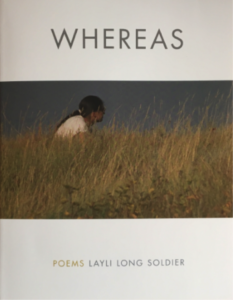 Each word, every comma, and every line in Layli Long Solider’s collection Whereas takes the page and transforms it, calling attention to the way terminology is deployed as a colonial weapon, the complexities of translation and the way language can shape our personal and national narratives. To say “I love this book” is to say I’ve spent more than one afternoon walking around my apartment reading it aloud; in awe of “light and those bubbles blown from a plastic wand to spring air into a hundred thousand bursts,” and “the rise and fall of the voice we must capture to mean a thing in writing.” These are poems impossible to pull away from, fierce and moving. Another must-read.
Each word, every comma, and every line in Layli Long Solider’s collection Whereas takes the page and transforms it, calling attention to the way terminology is deployed as a colonial weapon, the complexities of translation and the way language can shape our personal and national narratives. To say “I love this book” is to say I’ve spent more than one afternoon walking around my apartment reading it aloud; in awe of “light and those bubbles blown from a plastic wand to spring air into a hundred thousand bursts,” and “the rise and fall of the voice we must capture to mean a thing in writing.” These are poems impossible to pull away from, fierce and moving. Another must-read.
Shazia Hafiz Ramji, poetry editor, picks:
The Original Face by Guillaume Morissette
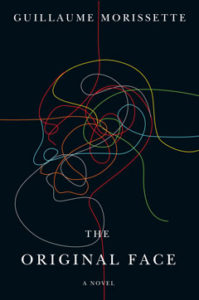 Guillaume Morissette’s second novel, The Original Face, is titled after the Zen Buddhist concept of the same name, which refers to the “face you had before you were born, before your parents were born.” The novel is told through the first-person narrator-protagonist, Daniel, a 29-year-old internet artist who lives in Montreal and struggles to make art. He is caught in the loop of hoping to save money so that he can focus on his art by not working in the future, but he quits jobs frequently, unable to perform the banalities of work. He is also very self-aware about how he is being perceived on social media. The space of what would have been his private thoughts is oriented towards the public, leaving Daniel scatterbrained, frantic, and tired. He eventually confronts himself — alone. The Original Face is necessary reading for a generation of millennials, especially those whose creativity has been absorbed and regurgitated for profit as they try to stay true to their art and themselves while also eking out a living in the city.
Guillaume Morissette’s second novel, The Original Face, is titled after the Zen Buddhist concept of the same name, which refers to the “face you had before you were born, before your parents were born.” The novel is told through the first-person narrator-protagonist, Daniel, a 29-year-old internet artist who lives in Montreal and struggles to make art. He is caught in the loop of hoping to save money so that he can focus on his art by not working in the future, but he quits jobs frequently, unable to perform the banalities of work. He is also very self-aware about how he is being perceived on social media. The space of what would have been his private thoughts is oriented towards the public, leaving Daniel scatterbrained, frantic, and tired. He eventually confronts himself — alone. The Original Face is necessary reading for a generation of millennials, especially those whose creativity has been absorbed and regurgitated for profit as they try to stay true to their art and themselves while also eking out a living in the city.
All We Saw by Anne Michaels
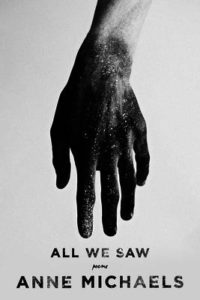 All We Saw by Anne Michaels is the acclaimed author’s sixth collection of poetry. She takes up her career-long argument with loss, this time as an elegy for friends who passed away recently. But All We Saw does not romanticize death and grief. Instead it continues a friendship enlivened by memory. Consider one the most striking poems, “To Write,” a litany that begins and ends with the line: “because the dead can read.” It reveals a belief in the continuation of a conversation made possible by poetry: “every poem is a shade tree // between us we can say / always.” All We Saw speaks to the writerly belief in a friendship that can continue beyond death. If there is courage, love, and daring, it is in this book of poems.
All We Saw by Anne Michaels is the acclaimed author’s sixth collection of poetry. She takes up her career-long argument with loss, this time as an elegy for friends who passed away recently. But All We Saw does not romanticize death and grief. Instead it continues a friendship enlivened by memory. Consider one the most striking poems, “To Write,” a litany that begins and ends with the line: “because the dead can read.” It reveals a belief in the continuation of a conversation made possible by poetry: “every poem is a shade tree // between us we can say / always.” All We Saw speaks to the writerly belief in a friendship that can continue beyond death. If there is courage, love, and daring, it is in this book of poems.
Everything is Awful and You’re a Terrible Person by Daniel Zomparelli
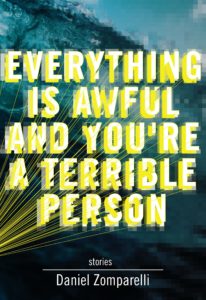 Everything is Awful and You’re a Terrible Person by Daniel Zomparelli is a debut book of short stories that is sad and funny at the same time. The protagonists are gay men looking for love online and at the office, everywhere and anywhere. Sets of stories are broken by poem-like interludes. The first interlude reveals the way abandonment and absence work through the lives of all the characters. Consider the story that follows, “Ghosts Can Be Boyfriends Too,” in which a couple moves in together. The protagonist’s partner talks in his sleep and the morning after a night of partying, his partner, Derek, says that his dead ex is haunting their apartment. The protagonist proposes a threesome with the ghost and they try it, but soon after, Derek leaves all of a sudden. The protagonist is left alone and begins to talk with the ghost of his partner’s ex. These are the kinds of surprises and genre-defying turns that define Everything is Awful and You’re a Terrible Person. It’s a must-read for those who love to be in love.
Everything is Awful and You’re a Terrible Person by Daniel Zomparelli is a debut book of short stories that is sad and funny at the same time. The protagonists are gay men looking for love online and at the office, everywhere and anywhere. Sets of stories are broken by poem-like interludes. The first interlude reveals the way abandonment and absence work through the lives of all the characters. Consider the story that follows, “Ghosts Can Be Boyfriends Too,” in which a couple moves in together. The protagonist’s partner talks in his sleep and the morning after a night of partying, his partner, Derek, says that his dead ex is haunting their apartment. The protagonist proposes a threesome with the ghost and they try it, but soon after, Derek leaves all of a sudden. The protagonist is left alone and begins to talk with the ghost of his partner’s ex. These are the kinds of surprises and genre-defying turns that define Everything is Awful and You’re a Terrible Person. It’s a must-read for those who love to be in love.